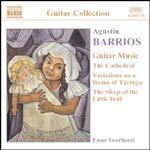
Barrios, Agustin-Guitar Works Vol. 2
 $25.00
Out of Stock
$25.00
Out of Stock6+ weeks add to cart
Barrios, Agustin-Guitar Works Vol. 2
Enno Voorhorst, guitar
[ Naxos Guitar Collection / CD ]
Release Date: Monday 30 June 2003
This item is currently out of stock. It may take 6 or more weeks to obtain from when you place your order as this is a specialist product.
"Quiet, reflective, intriguing classical guitar music. Strongly recommended."
- MusicWeb Dec 2004
Agustín Pío Barrios Mangoré was born in southern Paraguay on 5th May, 1885, and died on 7th August, 1944, in San Salvador, El Salvador. To many Barrios was the greatest of all guitarist composers. In view of this, it is curious that his music lay undiscovered and unappreciated for over three decades after his death. In the mid-1970s comprehensive editions of his music appeared, making it possible for guitarists of a younger generation to study his music, augmenting and complementing more traditional repertoire. The revival began in 1977 with a release by John Williams of an entire recording of music by Barrios, bringing long overdue recognition to this forgotten Latin American guitarist. Today Barrios' music is frequently performed by major concert artists and is appreciated by audiences world wide.
As a young man Barrios never studied in a formal music conservatory, and completed only two years of high school. He made his living from performing, and had no other professional skills in any other pursuit except playing the guitar and composing music. The exigencies of life as a performer brought constant travel and he never really settled down in one particular country. He spent extended periods of time in Brazil (1915-1919), Uruguay (1912-1915, 1919-1927) and
El Salvador (1939-1944). In none of these places did he establish a conservatory, nor did he pursue the systematic publication of his music. He escaped from Latin America only once in 1934, when he visited Europe, staying just fifteen months, but his lifelong goal of reaching the United States never came to fruition.
Invocación a Mi Madre was dedicated to the composer's mother, Doña Martina Ferreira de Barrios. The version heard here is taken from a non-commmercial 12-inch 78rpm disc recorded in Buenos Aires on 19th April, 1929 (perhaps a gift for his mother). It is a sentimental and tender expression of his great love for his mother and takes the form of a theme and variations somewhat in the style of a fantasia. In this work Barrios moves through several key centres demonstrating his mastery of harmonic modulation.
Undoubtedly one of Barrios'most-performed compositions, La Catedral was written in 1921 in Montevideo as a two-movement work featuring the Andante and Allegro only, which he recorded on a
12-inch disc on 1st August, 1928. Many years later he added the exquisite Preludio, providing a complete work that is an example of his finest writing. Barrios performed this work quite often throughout his career, probably more than any other of his compositions, a reflection of its popularity with the concert public. It is said that Barrios was staying in a hotel in downtown Montevideo, near the Cathedral of San José, and in the course of his practising and composing he constantly heard the bells of the cathedral ringing throughout the day. The tolling of these bells suggested to him the opening theme of the Andante religioso. Here the composer enters the cathedral, where he hears the organist playing the music of Bach, represented by the broad, horizontal chords of this movement. Thereafter he leaves to return again to the world of the street with its hustle and bustle of people and traffic, represented by the energetic and incessant semiquaver arpeggio texture of the Allegro solemne, a repeated note suggesting the incessant ringing of the church bell. The Preludio, subtitled Saudade (Nostalgia) was written in Havana in 1938, when Barrios was suffering from a decline in health complicated by a lack of money and the inevitable stress to his marital life that these difficult conditions created. In the Preludio he pours out his heart, yearning for the joy and comfort of former times. He performed La Catedral with the prelude for the first time in San Salvador on 25th July, 1938.
Tracks:
Invocacion a Mi Madre
01. Invocacion a Mi Madre 4:29
La Catedral
02. Preludio (Saudade) 2:16
03. Andante religioso 1:59
04. Allegro solemne 2:59
Confesion
05. Confesion 4:35
Cancion de la Hilandera
06. Cancion de la Hilandera 2:55
Oracion (Plegaria)
07. Oracion (Plegaria) 3:50
Madrecita
08. Madrecita 2:06
La Samaritana
09. La Samaritana 5:00
El Sueno de la Munequita
10. El Sueno de la Munequita 2:42
Contemplacion
11. Contemplacion 4:29
Oracion Para Todos
12. Oracion Para Todos 3:02
Minuet in B major
13. Minuet, B major 3:20
Minuet in E major
14. Minuet, E major 2:55
Minuet in A major
15. Minuet, A major 2:05
Minuet in C major
16. Minuet, C major 1:24
Divagacion en imitacion al violin
17. Divagacion en imitacion al violin 3:26
Variations on a Theme of Tarrega
18. Variations on a Theme of Tarrega 12:26


